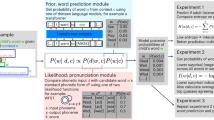Abstract
Certain linguistic structures imply speakers' beliefs about their utterances. Factuals imply that the speaker's hypothesis matches observed data; counterfactuals suggest that hypotheses and observations differ, and uncertainty implies that unclear observations make many hypotheses tenable. We examined how age(11-and 16-year-olds and college students) and syntactic structure (subordinating conjunctions, cognitive verbs, and verb modifications) affect the ability to specify the hypothetical and observational referents of expressions of factual, counterfactual, and uncertainty beliefs. There was considerable linguistic growth during adolescence. College students outperformed the younger students. Age differences were most pronounced on judging the hypothetical referents of counterfactuals and uncertainty structures. The two precollege groups often misinterpreted counterfactuals and uncertainty structures because they equated hypotheses with observations. They seldom understood that uncertainty meant that more than one hypothesis could account for observations. Verb modifications were easier to interpret than cognitive verbs, and subordinating conjunctions were hardest. Factuals were easier than counterfactuals and uncertainty structures.
Similar content being viewed by others
References
Bates, E. (1976).Language and context: The acquisition of pragmatics. New York: Academic Press.
Beal, C.R., & Flavell, J.H. (1984). Development of the ability to distiguish communicative intention and literal message meaning.Child Development, 55, 920–928.
Braine, M.D.S., & Rumain, B. (1983). Logical reasoning. In P.H. Mussen (Ed.),Handbook of child psychology: Vol. 3. Cognitive development (4th ed., pp. 263–340). New York: Wiley.
Case, R. (1985).Intellectual development: Birth to adulthood. New York: Academic Press.
Bretherton, I., & Beeghly, M. (1982). Talking about internal states: The acquisition of an explicit theory of mind.Developmental Psychology, 18, 906–921.
Emerson, H.F. (1979). Children's comprehension of “because” in reversible and nonreversible sentences.Journal of Child Language, 6, 279–300.
Emerson, H.F., & Gekoski, W.L. (1980). Development of comprehension of sentences with “because” or “if”.Journal of Experimental Child Psychology, 29, 202–224.
Flavell, J.H., Green, F.L., & Flavell, E.R. (1985). The road not taken: Understanding the implications of initial uncertainty in evaluating spatial directions.Developmental Psychology, 21, 207–216.
Harris, R.J. (1975). Children's understanding of complex sentences.Journal of Experimental Child Psychology, 19, 420–433.
Hood, L. & Bloom, L. (1979). What, when and how about why: A longitudinal study of early expressions of causality.Monographs of the Society for Research in Child Development, 44(6, Serial No. 181).
Hopman, M., & Maratsos, M.P. (1978). A developmental study of factivity and negation in complex sentences.Journal of Child Language, 5, 295–309.
Johnson, C.N., & Maratsos, M.P. (1977). Early comprehension of mental verbs:Think andknow.Child Development, 48, 1743–1747.
Johnson, C.N., & Wellman, H.M. (1980). Children's developing understanding of mental verbs: Remember, know and guess.Child Development, 51, 1095–1102.
Karttunen, L. (1971). Counterfactual conditionals.Linguistic Inquiry, 2, 566–569.
Kuczaj, S.A., & Daly, M.J. (1979). The development of hypothetical reference in the speech of young children.Journal of Child Language, 6, 563–579.
Lakoff, G. (1970). Linguistics and natural logic.Synthese, 22, 151–271.
Miscione, J.L., Marvin, R.S., O'Brien, R.G., & Greenberg, M.T. (1978). A developmental study of preschool children's understanding of the words “know” and “guess”.Child Development, 49, 1107–1113.
Olson, D.R., & Torrance, N. (in press). Language, literacy and mental states.Discourse Processes.
Peterson, G., & McCabe, A. (1985). Understanding “because”: How important is the task?Journal of Psycholinguistic Research, 14, 199–217.
Piaget, J. (1977).The development of thought: Equilibration of cognitive structures. New York: Viking.
Robinson, E.J., & Robinson, W. (1977). Children's explanations of the inadequacy of the misunderstood message.Developmental Psychology, 13, 156–161.
Rumelhart, D.E. (1980). Schemata: The building blocks of cognition. In R.J. Spiro, B.C. Bruce, & W.F. Brewer (Eds.),Theoretical issues in reading comprehension (pp. 33–58). Hillsdale, New Jersey: Erlbaum.
Shatz, M., Wellman, H.M., & Silber, S. (1983). The acquisition of mental verbs: A systematic investigation of the first reference to mental state.Cognition, 14, 301–321.
Sonnenschein, S. (1984). Why young listeners do not benefit from differentiating verbal redundancy.Child Development, 55, 929–935.
Wellman, H.M., & Estes, D. (in press). Children's early use of mental verbs and what they mean.Discourse Processes.
Wellman, H.M., & Johnson, C.N. (1979). Understanding mental processes: A developmental study ofremember andforget.Child Development, 50, 79–88.
Wing, C.S., & Scholnick, E.K. (1981). Children's comprehension of pragmatic concepts expressed inbecause, although, if, and unless.Journal of Child Language, 8, 347–365.
Winner, E. (1979). New names for old things: The emergence of metaphoric language.Journal of Child Language, 6, 469–491.
Author information
Authors and Affiliations
Rights and permissions
About this article
Cite this article
Wing, C.S., Scholnick, E.K. Understanding the language of reasoning: Cognitive, linguistic, and developmental influences. J Psycholinguist Res 15, 383–401 (1986). https://doi.org/10.1007/BF01067721
Accepted:
Issue Date:
DOI: https://doi.org/10.1007/BF01067721




